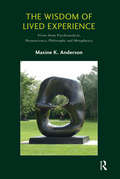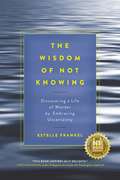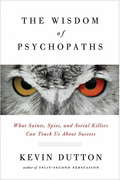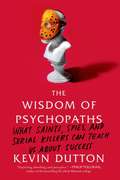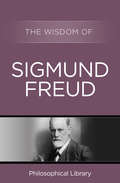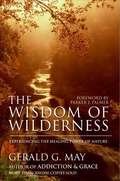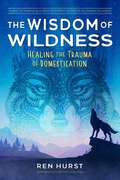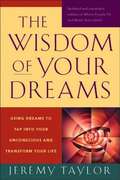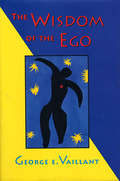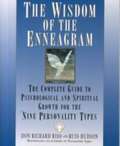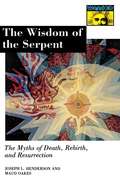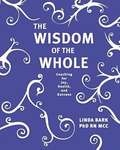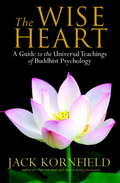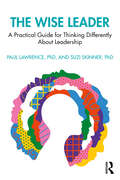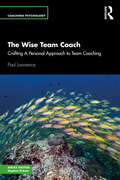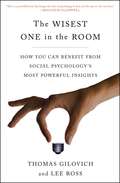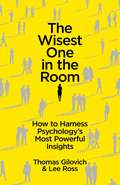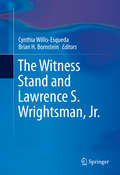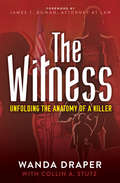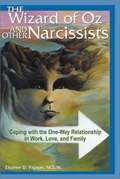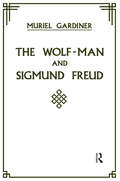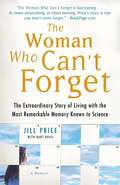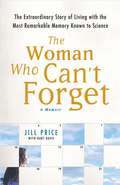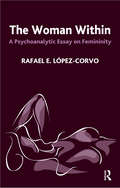- Table View
- List View
The Wisdom of Lived Experience: Views from Psychoanalysis, Neuroscience, Philosophy and Metaphysics
by Maxine K. AndersonIn our quest toward truth we often rely on the guidance and clarity of conscious thought, but in doing so we may bypass awareness of a more deeply informing resource, which is embodied in lived experience. This book highlights aspects of this deeper dialogue where neuroscience (McGilchrist's work on right- and left-brain dynamics, and Solm's emphases on the enlivening role of affect) and psychoanalysis (Freud, Klein, Winnicott, Bion, and others) verify the Hegelian dialectics that seem to underlie all living processes and perhaps all of Nature. Hegel's concept of Aufhebung embraces the creative negating transformations that carry forward what has gone before in new and evolving forms and structures. Becoming, as on-going lived experience, exemplifies this dialectic as it embodies the cycle in which the emergence of unconscious (implicit) intuition is externalized and clarified (made explicit) via conscious notation and thought to then be enfolded back (made implicit once again) into the newly enriched unconscious matrix that becomes the root for the next intuition.
The Wisdom of Not Knowing: Discovering a Life of Wonder by Embracing Uncertainty
by Estelle FrankelA deeply affirming exploration of the challenges and possibilities of the unknown--with meditations and exercises that can help transform the fear and uncertainty of "not knowing" into a sense of openness, curiosity, and bravery.For most of us the unknown is both friend and foe. At times it can be a source of paralyzing fear and uncertainty, and at other times it can be a starting point for transformation, creativity, and growth. The unknown is a deep current that runs throughout all religions and mystical traditions, and it is also the nexus of contemporary psychotherapeutic thought and practice and a key element in all personal growth and healing. In The Wisdom of Not Knowing, psychotherapist Estelle Frankel shows us that our psychological, emotional, and spiritual health is radically influenced by how comfortable we are at navigating the unknown and uncertain dimensions of our lives.Drawing on insights from Kabbalah, depth psychology, Buddhism, Christianity, Hinduism, and ancient myth, Frankel explores how we can grow our souls by tapping into the wisdom of not knowing. She also includes case studies of individuals who have grappled with their fears of the unknown and, as a result, have come out wiser, stronger, and more resilient. Each chapter includes experiential exercises and/or meditations for befriending the unknown. These exercises help convey how we must be willing to "not know" in order to gain knowledge and be able to bear uncertainty so we can be free to enjoy a healthy sense of adventure and curiosity.
The Wisdom of Psychopaths
by Kevin DuttonPsychopath. The word conjurs up images of serial killers, rapists, suicide bombers, gangsters. But think again: you could probably benefit from being a little more psychopathic yourself.Psychologist Kevin Dutton has made a speciality of psychopathy, and is on first-name terms with many notorious killers. But unlike those incarcerated psychopaths, and all those depicted in movies and crime fiction, most are not violent, he explains. In fact, says Prof Dutton, they have a lot of good things going for them. Psychopaths are fearless, confident, charismatic and focused--qualities tailor-made for success in today's society.The Wisdom of Psychopaths is an intellectual rollercoaster ride that combines lightning-hot science with unprecedented access to secret monasteries, Special Forces training camps, and high-security hospitals. In it, you will meet serial killers, war heroes, financiers, movie stars and attorneys--and discover that beneath the hype and popular characterization, psychopaths have something to teach us. Like the knobs on a mixing deck, psychopathy is graded. And finding the right combination of psychopathic traits, sampled and mixed at carefully calibrated volumes, can put us ahead of the game.
The Wisdom of Psychopaths: What Saints, Spies, and Serial Killers Can Teach Us About Success
by Kevin DuttonIn this engrossing journey into the lives of psychopaths and their infamously crafty behaviors, the renowned psychologist Kevin Dutton reveals that there is a scale of "madness" along which we all sit. Incorporating the latest advances in brain scanning and neuroscience, Dutton demonstrates that the brilliant neurosurgeon who lacks empathy has more in common with a Ted Bundy who kills for pleasure than we may wish to admit, and that a mugger in a dimly lit parking lot may well, in fact, have the same nerveless poise as a titan of industry. Dutton argues that there are indeed "functional psychopaths" among us―different from their murderous counterparts―who use their detached, unflinching, and charismatic personalities to succeed in mainstream society, and that shockingly, in some fields, the more "psychopathic" people are, the more likely they are to succeed. Dutton deconstructs this often misunderstood diagnosis through bold on-the-ground reporting and original scientific research as he mingles with the criminally insane in a high-security ward, shares a drink with one of the world's most successful con artists, and undergoes transcranial magnetic stimulation to discover firsthand exactly how it feels to see through the eyes of a psychopath. As Dutton develops his theory that we all possess psychopathic tendencies, he puts forward the argument that society as a whole is more psychopathic than ever: after all, psychopaths tend to be fearless, confident, charming, ruthless, and focused―qualities that are tailor-made for success in the twenty-first century. Provocative at every turn, The Wisdom of Psychopaths is a riveting adventure that reveals that it's our much-maligned dark side that often conceals the trump cards of success.
The Wisdom of Sigmund Freud (Wisdom)
by The Wisdom SeriesAn invaluable guide to Freud&’s terminology and work. Repression, ego, analysis, neurosis—the language of psychology permeates our modern vocabulary. The brilliant observations of Sigmund Freud form not only the basis for psychoanalysis but also much of our current understanding of the human condition. This essential and approachable guide offers an A-to-Z glossary of terminology defined in Freud&’s own words, including his diagnostic and treatment recommendations as well as his well-known works, including dream interpretation, the Oedipal complex, and the practice of psychoanalysis. This ebook features a new introduction, image gallery, and index of the Hebrew alphabet.
The Wisdom of Wildness: Healing the Trauma of Domestication
by Ren HurstA guide to rewilding your heart, so you can undomesticate your life• Explores 13 principles of unconditional love for addressing the trauma of domestication, healing relationships, and restoring deep connection to the inner guidance of your wild soul• Explains the nature of trauma from the perspective of emotional development• Provides experiential practices for the cultivation of authentic relationships that are free of exploitation and codependencyHOW CAN WE RECLAIM our wild soul and approach life with authenticity and emotional maturity? Looking deeply into the nature of domestication and humanity&’s relationship to other animals, Ren Hurst finds our own domestication--and our resultant disconnection from nature--to be the root trauma for much of the human experience, which we seem to perpetuate by domesticating others. Ren offers another path: she reverse-engineered the conditioning process that leads to domestication and discovered a practical road map for deprogramming and undomesticating yourself in order to heal, restore connection, and reclaim the innate wisdom of wildness within. Sharing enlightening moments from her journey with a half-wild husky, Denali, The Wisdom of Wildness shows how only when emotional awareness and authentic leadership link in with your own wild parts can an authentic relationship between human and animal--or between oneself and another person--be possible. In her transformative body of work, Sanctuary13, Ren unveils 13 principles of unconditional love for deprogramming yourself, healing the trauma of domestication, and reviving deep connection to inner guidance, your wild soul, and, ultimately, freedom. Experiential practices help you cultivate authentic, undomesticated relationships free of exploitation and codependency, whether with human or animal companions. Instinct, intuition, and inspiration are just waiting to be reclaimed on this paradigm-shifting path toward healing and true soul connection.
The Wisdom of Your Dreams
by Jeremy TaylorDiscover how the hidden messages in your dreams can change your life. A renowned expert on the subject of dreams, Jeremy Taylor has studied dreams and has worked with thousands of people both individually and in dream groups for more than forty years. His discoveries show us how dreams can be the keys to gaining insight into our past and our conflicts, as well as excursions into the fantastic realm of creative inspiration. An expanded and updated edition of his classic guide to understanding your dreams—Where People Fly and Water Runs Uphill—The Wisdom of Your Dreams provides readers with specific, hands-on techniques to help them remember and interpret their dreams, establish a dream group, and learn the universal symbolism of dreaming. Full of case histories and featuring a revised introduction by the author and a new chapter about dreams as clues to the evolution of consciousness, this is a life- changing and potentially world-changing work. .
The Wisdom of Your Dreams
by Jeremy TaylorDiscover how the hidden messages in your dreams can change your life. A renowned expert on the subject of dreams, Jeremy Taylor has studied dreams and has worked with thousands of people both individually and in dream groups for more than forty years. His discoveries show us how dreams can be the keys to gaining insight into our past and our conflicts, as well as excursions into the fantastic realm of creative inspiration. An expanded and updated edition of his classic guide to understanding your dreams--Where People Fly and Water Runs Uphill--The Wisdom of Your Dreams provides readers with specific, hands-on techniques to help them remember and interpret their dreams, establish a dream group, and learn the universal symbolism of dreaming. Full of case histories and featuring a revised introduction by the author and a new chapter about dreams as clues to the evolution of consciousness, this is a life- changing and potentially world-changing work.
The Wisdom of the Ego
by George E. VaillantOne of America's preeminent psychiatrists draws on his famous Study of Adult Development to give us an exhilarating look at how the mind's defenses work. What we see as the mind's trickery, George Vaillant tells us, is actually healthy. What's more, it can reveal the mind at its most creative and mature, soothing and protecting us in the face of unbearable reality, managing the unmanageable, ordering disorder. And because creativity is so intrinsic to this alchemy of the ego, Vaillant mingles his studies of obscure lives with psychobiographies of famous artists and others--including Florence Nightingale, Sylvia Plath, Anna Freud, and Eugene O'Neill.
The Wisdom of the Enneagram: The Complete Guide to Psychological and Spiritual Growth for the Nine Personality Types
by Don Richard Riso Russ HudsonThe Enneagram of personality is a modern synthesis of ancient and modern psychological and spiritual teachings. The contents of this book are the result of the original work of the authors, and no body of Enneagram material has been passed down in a preexisting "oral tradition" in the public domain. Please respect the rights of the authors by not photocopying or otherwise infringing this copyrighted material. This book has been copyrighted and may not be reproduced in whole or in part by any means whatsoever without the expressed written permission of Bantam Books. If you would like to obtain multiple copies of this book at a reduced price, please order them in bulk from the publisher. See page 390 of this book for ordering information.
The Wisdom of the Serpent: The Myths of Death, Rebirth, and Resurrection. (Mythos: The Princeton/Bollingen Series in World Mythology #136)
by Maud Oakes Joseph Lewis HendersonThe tribal initiation of the shaman, the archetype of the serpent, exemplifies the death of the self and a rebirth into transcendent life. This book traces the images of spiritual initiation in religious rituals and myths of resurrection, poems and epics, cycles of nature, and art and dreaming. It dramatizes the metamorphosis from a common experience of death's inevitability into a transcendent freedom beyond individual limitations. "This is a classic work in analytical psychology that offers crucial insights on the meaning of death symbolism (and its inevitably accompanying rebirth and resurrection symbolism) as part of the great theme of initiation, of which [Henderson] is the world's foremost psychological interpreter. This material is really the next step after the hero myth that Joseph Campbell has made so popular, and provides an understanding of how not to use the hero myth in an inflated way as a psychology of mastery, but as an attainment progressively to be died beyond. [Henderson] is helped by the presence of Maud Oakes, who is a trained anthropologist with exquisite taste in her choice of mythic materials and respect for their original contexts."--John Beebe
The Wisdom of the Whole: Coaching for Joy, Health, and Success
by Linda Bark<p>Learn all about holistic/integral coaching! If you are a professional who helps others to lead flourishing, happier lives, this book will help you become even more effective. If you are interested in learning about effective change for yourself, this book is also for you because of its fun and easy design, playful illustrations, and interactive exercises. <p>The Wisdom of the Whole invites people to look through multiple windows for exploration and action. The powerful mental tools described in this book are based on critical thinking, analysis, and planning. But we can’t stop there! The stories clients tell themselves as well as techniques such as imagery and affirmations, can help clients travel forward on a path to their goals. Ways for coaches and clients to employ intuition and the more subtle aspects of being add to the complete approach. Finding out how sense of purpose can impact motivation or shape an aspiration is also part of this model described here. The multidimensional approach enables people to move more quickly and easily toward their goals with greater authenticity, often eliminating false starts or wrong turns.
The Wise Heart: A Guide to the Universal Teachings of Buddhist Psychology
by Jack KornfieldFor over 2000 years, Buddhist psychology has offered invaluable insights into the nature of the heart and mind, and transformed the way many people around the world handle life's challenges. But the ancient texts on which these remarkable teachings are based can be difficult to penetrate for modern seekers. Now, drawing on his experience as a monk trained in Thailand, Burma and India, as well as his expert psychology practice, Jack Kornfield provides an accessible, definitive guide for Buddhists and non-Buddhists alike. This important new work is in the tradition of his classic works A Path with Heart and After the Ectasy, the Laundry, offering practical tools to coping with modern life and dealing with emotions such as fear, anger and shame. Kornfield also shares the illuminating stories of his students and fellow practitioners, as well as his own journey towards enlightenment, including his recovery from a violence-filled childhood. Here is a rare treasure that will give readers greater access to the secret beauty within - and without.
The Wise Leader: A Practical Guide for Thinking Differently About Leadership
by Paul Lawrence Suzi SkinnerThe Wise Leader offers readers a succinct perspective on wise leadership based on theory, practice, and the authors’ own experience. The five sections of the book describe the Wise Leader model, five mantras that distil the essence of wisdom for leading. Each section has a theoretical component, theory that the authors seek to bring to life through everyday examples, followed by practical ideas and guidance as to what you can next do in service of becoming a wiser, more effective leader. Each mantra then includes fresh perspectives for leadership development, aimed at supporting organisations globally to maximise their considerable investment in this critical area. This book is written for leaders at every level of an organisation, providing a perspective of wise leadership that lends itself to practical application. It can also be used by leadership development professionals, offering guidance on how to build practical programs to cultivate enhanced levels of wise leadership in your organisation.
The Wise Team Coach: Crafting A Personal Approach To Team Coaching (Coaching Psychology)
by Paul LawrenceBased on three years of meta- research into team effectiveness and coaching, this book explores some of the most common contradictions and debates around the topic of team coaching and presents readers with a framework to enable them to explore this field for themselves, reflecting on their own experience and drawing their own conclusions.Team coaching in organisations is still a relatively new discipline, with industry associations having only recently defined their first attempts to frame team coaching in the form of standard skills and competencies. As a new discipline we still see multiple perspectives on what team coaching is, and how it should best be practiced. The literature abounds with paradox and contradictions. Within this book Lawrence delves into these contradictions and debates, providing a framework to encourage readers to construct their own practice model. Covering both theory and practical application, this will be a useful guide for both experienced team coaches and those entering the field.
The Wisest One in the Room
by Thomas Gilovich Lee RossRenowned psychologists describe the most useful insights from social psychology that can help make you "wise": wise about why people behave the way they do, and wise about how to use that knowledge in understanding and influencing the people in your life.When faced with a challenge, we often turn to those we trust for words of wisdom. Friends, relatives, and colleagues: someone with the best advice about how to boost sales, the most useful insights into raising children, or the sharpest take on an ongoing conflict. In The Wisest One in the Room, renowned social psychologists Thomas Gilovich and Lee Ross ask: Why? What do these people know? What are the foundations of their wisdom? And, as professors and researchers who specialize in the study of human behavior, they wonder: What general principles of human psychology are they drawing on to reach these conclusions? They begin by noting that wisdom, unlike intelligence, demands some insight into people--their hopes, fears, passions, and drives. It's true for the executive running a Fortune 500 company, the candidate seeking public office, the artist trying to create work that will speak to the ages, or the single parent trying to get a child through the tumultuous adolescent years. To be wise, they maintain, one must be psych-wise. Gilovich and Ross show that to answer any kind of behavioral question, it is essential to understand the details--especially the hidden and subtle details--of the situational forces acting upon us. Understanding these forces is the key to becoming wiser in the way we understand the people and events we encounter, and wiser in the way we deal with the challenges that are sure to come our way--perhaps even the key to becoming "the wisest in the room."
The Wisest One in the Room: How To Harness Psychology’s Most Powerful Insights
by Thomas Gilovich Lee RossIn any room full of people, there tends to be one individual to whom others turn when they are in search of answers. This person has the most useful advice for facing life's daily challenges, the most enlightening views on world events, and the sharpest take on business dilemmas. They are the wisest one in the room.Taking us through modern psychology's five pillars wisdom, Gilovich and Ross give us a vital insight into the principles that underlie human behavior. Understand why it is so difficult to get someone to change their behavior. Learn how narrow our own individual perspectives truly are. And discover how we might be able to affect widespread change through the smallest alterations. A truly fascinating work, The Wisest One in the Room helps us to understand why people act as they do whilst also showing us how we can become more 'psych-wise' and improve our own lives as a result.
The Witness Stand and Lawrence S. Wrightsman, Jr.
by Brian H. Bornstein Cynthia Willis-EsquedaThis unique volume salutes the work of pioneering forensic psychologist Lawrence S. Wrightsman, Jr. , by presenting current theorizing and research findings on issues that define the field of psychology and law. Ongoing topics in witness behaviors, suspect identification, and juror decision making illustrate how psychology and law complement and also conflict at various stages in legal processes. The book also sheds light on evolving areas such as DNA exonerations, professional trial consulting, and jury selection strategies, and the distinct challenges and opportunities these issues present. Noted contributors to the book include Wrightsman himself, who offers salient observations on the field that he continues to inspire. Featured among the topics: The credibility of witnesses. Psychological science on eyewitness identification and the U. S. Supreme Court. False confessions, from colonial Salem to today. Identifying juror bias: toward a new generation of jury selection research. Law and social science: how interdisciplinary is interdisciplinary enough? Race and its place in the American legal system. With its diverse mix of perspectives and methodologies, The Witness Stand and Lawrence S. Wrightsman, Jr. will interest forensic researchers in academic and applied settings, as well as individuals working in the legal system, such as attorneys, judges and law enforcement personnel.
The Witness: Unfolding the Anatomy of a Killer
by Wanda Draper Collin A. StutzA professional behavioral witness to more than a hundred capital trials explores the making of a murderer. CSI shows us where a crime is committed. Forensic detectives show us how. But what really goes on in the mind of killer? What is it in each potential victim that sparks in them the urge to take a life? What are the reasons behind a quick thrill kill, or slow torture? Between choosing someone they know, or a stranger? As they stand before a jury, after reams of graphic evidence, the question is no longer whether or not they committed the unthinkable. The question posed to Wanda Draper, expert in behavioral science and child development, and key witness in more than a hundred high-profile trials, is why? The answer is all that stands between a sentence of life in prison or death row. In this unique true-crime investigation, Draper shares some of the darkest cases of her career. She sheds light on the personal circumstances and critical life events that perverted childhoods and brought convicted murderers to trial. She reveals how the past casts a grave shadow over one&’s future. And in doing so, explores one irrefutable fact: killers aren&’t born, they&’re made.
The Wizard of Oz and other Narcissists: Coping with the One-Way Relationship in Work, Love, and Family
by Eleanor PaysonEvery day headlines are filled with examples of narcissistic individuals in positions of power who are nothing more than impostors plundering and wreaking havoc on the lives of others. From the financial barons of Wall Street to our elected officials in government, we are confronted daily with narcissists and the self-serving systems that enable them. Helping people reclaim their lives from this sinister exploitative force is the mission behind Payson's book, The Wizard of Oz and Other Narcissists: Coping with the One-Way Relationship in Work, Love, and Family. Using simple metaphors from the American classic, The Wizard of Oz, Payson illustrates how Dorothy's journey captures all the seductive illusions and challenges that occur when we encounter the narcissist. Empowering the reader with the ABCs of unhealthy narcissism and the unique problems that occur when a person becomes involved with the narcissist, Payson gives step-by-step practical tools to identify, protect, and heal from these destructive relationships. Largely un-addressed in the psychology and self-help literature, this ground breaking book offers hope and help to those who have been drawn into these devastating relationships. She includes illuminating case studies that identify the problems that occur in the different types of relationships, from co-workers, to friends, to parents, to lovers. Readers employing these insights and skills will find new abilities to identify and protect against the narcissist's manipulations and take back control of their lives.
The Wolf-Man and Sigmund Freud
by Muriel GardinerIt is a well known that the Wolf-Man was the subject of what James Strachey described as 'the most elaborate and no doubt the most important of all Freud's case histories'. It is less well known that he was still living in Vienna more than half a century since his analysis with Freud. In this remarkable biographical account, the Wolf-Man comes alive not only through Freud's case history, which is reprinted in full, and Ruth Mack Brunswick's account of the follow-up analysis which she conducted, but also through his own autobiographical memoirs covering his childhood in Russia, his recollections of Freud, his marriage, and the circumstances of his life in Vienna after the First World War. The story of the Wolf-Man's later years is told by the editor of this volume, the author, who kept in close touch with him following the shattering suicide of his wife in 1938.
The Woman Who Can't Forget
by Bart Davis Jill PriceJill Price has the first diagnosed case of a memory condition called "hyperthymestic syndrome" -- the continuous, automatic, autobiographical recall of every day of her life since she was fourteen. Give her any date from that year on, and she can almost instantly tell you what day of the week it was, what she did on that day, and any major world event or cultural happening that took place, as long as she heard about it that day. Her memories are like scenes from home movies, constantly playing in her head, backward and forward, through the years; not only does she make no effort to call her memories to mind, she cannot stop them. The Woman Who Can't Forget is the beautifully written and moving story of Jill's quest to come to terms with her extraordinary memory, living with a condition that no one understood, including her, until the scientific team who studied her finally charted the extraordinary terrain of her abilities. Her fascinating journey speaks volumes about the delicate dance of remembering and forgetting in all of our lives and the many mysteries about how our memories shape us. As we learn of Jill's struggles first to realize how unusual her memory is and then to contend, as she grows up, with the unique challenges of not being able to forget -- remembering both the good times and the bad, the joyous and the devastating, in such vivid and insistent detail -- the way her memory works is contrasted to a wealth of discoveries about the workings of normal human memory and normal human forgetting. Intriguing light is shed on the vital role of what's called "motivated forgetting"; as well as theories about childhood amnesia, the loss of memory for the first two to three years of our lives; the emotional content of memories; and the way in which autobiographical memories are normally crafted into an ever-evolving and empowering life story. Would we want to remember so much more of our lives if we could? Which memories do our minds privilege over others? Do we truly relive the times we remember most vividly, feeling the emotions that coursed through us then? Why do we forget so much, and in what ways do the workings of memory tailor the reality of what's actually happened to us in our lives? In The Woman Who Can't Forget, Jill Price welcomes us into her remarkable life and takes us on a mind-opening voyage into what life would be like if we didn't forget -- a voyage after which no reader will think of the magical role of memory in our lives in the same way again.
The Woman Who Can't Forget: The Extraordinary Story Of Living With The Most Remarkable Memory Known To Science
by Bart Davis Jill PricePeople might envy someone with such an extraordinary memory that she has been studied by neuroscientists, until they learn that Jill Price's ability extends only to details of her own life, sometimes haunting her, and does not to apply to memorizing facts. In collaboration with an established writer, this Los Angeles resident relates how she has coped since adolescence with hyperthymestic syndrome (defined in the glossary), in the context of current understanding of how memory works. This first-known case was documented in a 2006 journal article.
The Woman Within: A Psychoanalytic Essay on Femininity
by Rafael E. Lopez-CorvoAlthough it is quite possible that many will consider this book irreverent or disrespectful of ideas or institutions, the author is certain that they will also perceive it as a defender of women and their unquestionable transcendence throughout history. The main ideas the author now shares publicly, are ones the author has considered for many years: the classification of the 'Eves', the masochistic character of women, the concept of giraffe women, etc.. Other ideas appeared afterwards, some at the last moment, as the author enjoyed the company of friends, who frequently and generously lend their time to discuss with me their own opinions... the author believes that there is a universal feminine principle just as there is a masculine one, the difference remains in the fact that, from the very beginning of creation, everything about man has already been said and nothing continues to be undisclosed, whereas woman, is an untold story yet to be discovered.
